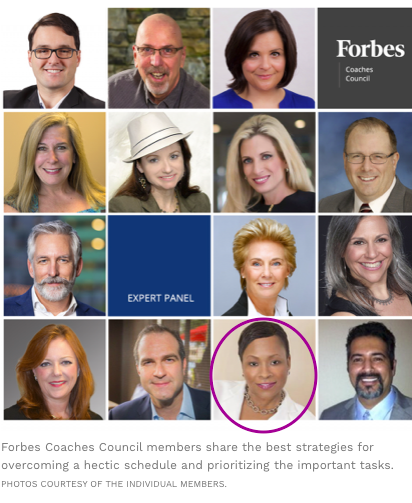Author: June
How Business Leaders Can Help Others Manage Grief
#2 Find Out What Matters To Your Employees (June Stewart, Amplify Partners, LLC)
Lending a supportive ear means inquiring, asking questions and offering resources for matters that are important to your employees. Leading with deeper levels of empathy and tending to the whole person is more natural and meaningful than any other approach. It’s a great reminder of the call of leadership, and that is to serve.
Check out the full article @ForbesCoachesCouncil How To Help Others Manage Grief: 16 Lessons For Business Leaders
The Power of Presence: Developing Your Leadership Brand (Thurgood Marshall Fund #HennessyFellows 2020)
Humility enables the highest level of hearing! Wise words shared with #HennessyFellows from Talent Extraordinaire and Global Human Resource Operations Executive, June Stewart
Moet Hennessy Hennessy
CHECK OUT RELEVANT READS BY JUNE STEWART
Four Steps To Cultivating A Righteous Personal Brand
Lessons on Building a Wildly Successful Career in Tough Times
Hear what’s really working for leaders, managers, and individual contributors. The coaches discuss why #relationshipsmatter and more than ever how operating with heavier doses of empathy and compassion builds trust and enables resilience — for yourself and others. How to focus on the work that matters and leveraging June Stewart’s 4-Quadrants for working virtually.
COVID-19 has transformed the way we work and live and the merging of the two. This discussion reveals some real tips and truths for successfully navigating your career in this new environment.
Four Steps To Cultivating A Righteous Personal Brand
As seen on Forbes.com
At a time when we are overwhelmed with a culture determined to have a say in who we are, it’s increasingly difficult to hear and even follow our own voice. We were already navigating the thoughts and opinions of family, friends, teachers and colleagues. After all, everyone has an opinion, and many don’t mind sharing — invited or not.
And now we are bombarded with a culture that constantly gives voice via social media. Figuring out who you want to be, articulating it and living it requires a depth of self-discovery, honesty and determination that means listening and responding to your own voice. This is such an important aspect of success that we need to include it on our checklist of professional must-dos: attend undergraduate/graduate school, get internships, engage in service, develop a personal brand…
Being intentional about navigating the impression that we leave others and behaving and interacting in ways that are consistent and reflective of what we value isn’t anything new. My mom called it living with integrity. Stephen Covey called it having an end-in-mind way of living. I call it living on purpose.
Whatever you call it, your personal brand has a profound effect on your success. It is the impression and the narrative that results from your interactions — personal, professional and social. Your personal brand is your reputation. So know this: The story of who you are is being told. Your challenge is to ensure that  you are telling your story thoughtfully and intentionally. Success means developing your personal brand as a strength. It’s that simple and that hard — period. Here are four essential steps to creating and nurturing a righteous personal brand:
you are telling your story thoughtfully and intentionally. Success means developing your personal brand as a strength. It’s that simple and that hard — period. Here are four essential steps to creating and nurturing a righteous personal brand:
1. Live with soul-stirring authenticity. Be clear about your vision and values. Understand the behaviors, skills and experiences that you need to walk these out moment by moment, and be relentless about the consistency with which your words and actions align. Verbalize it. Do it. Live it. Repeat it.
2. Control your narrative with intention. With every interaction, the story of you is being told. The hard work is closing the gap between the vision of who you want to be, how others see you and how you see yourself. Get clear about those behaviors, actions and skills that stand in the way of you living in complete alignment. Your values should inform your choices.
3. Elevate your EQ (emotional intelligence). You can do this by continuously developing your capacity to:
• Adapt easily to change
• Demonstrate an appropriate amount of empathy for others
• React with self-control; monitor and understand your emotions
• Show curiosity; listen attentively; understand why people behave the way they do
• Know your strengths and weaknesses
• Maintain a positive life outlook; be an optimistic and inspirational person
4. Be cognizant of the qualitative value and quantitative cost associated with your credibility. When the interaction or transaction is complete, your credibility lingers. The evidence of your credibility will be apparent when your relationships are immersed with mutual respect. Your seat at the decision-making table is secured as your point of view, input and talent are sought after. There’s also the grace that’s extended when you make a mistake or fail. Equally important is the sense of peace, power and confidence that you gain along the way. All of these are consequences of developing your personal brand as strength.
Cultivating a righteous personal brand is the result of being able to hear and respond to your own voice. It’s about bringing who you are to what you do and how you do it. Delivering your personal brand with consistency creates memorable experiences that have real consequential value. Anyone with long-term, sustained success will tell you that building a personal brand is the price of admission and the foundational work essential for the journey. Verbalize it. Do it. Live it. Repeat it.
It’s 2020!
We use magical to describe those experiences, interactions, and results that are special, miraculous, extraordinary, fascinating, exciting. . . Happy New Year! Be #inspired. Be #intentional.
Busy Schedule? Try These Tactics To Prioritize Your To Do List
#13 Acting Not Reacting
Act on the important. Don’t react to the urgent. Create a weekly plan connected to your goals. Organize and schedule your work around the “big stuff.” Stay out of the gravel. Be an effective delegator and leverage technology to enable your productivity. Franklin Covey’s Productivity Matrix is a great resource for prioritizing and producing amazing results.
Originally published at: https://www.forbes.com/sites/forbescoachescouncil/2019/09/06/busy-schedule-try-these-14-tactics-to-prioritize-your-to-do-list/#1e0bc6957f79
Inclusive Leadership
Inclusive Leaders Are Your Most Valued Asset
We know that inclusive leaders have a positive affect on retention and the employee experience. For leaders to engage their workforce to deliver maximum value, they must learn how to fully utilize the talent of all employees. Deloitte quantifies the “long shadow” of inclusive leaders as driving up the percentage of employees that feel valued versus those that do not by 70%. In the same study, inclusive leaders improved team performance by 17%.
In addition to building trusting relationships, inclusive leaders tend to be adept at collaborating, managing change, and listening for understanding. They are also profoundly self-aware, curious, and demonstrate high degrees of self-control. Inclusive leaders operate at the higher end of the cultural intelligence scale. In the webinar “Coaching To Support Diversity & Inclusion,” our Principal & Chief Talent Officer, June Stewart discusses the impact and success our clients are having as they invest in growing people leaders’ capabilities. The correlation between improved employee retention, employee satisfaction, organization performance, and culture is palpable all the way to your bottom line.
AHA! (Ask, Hear, Act)
Employees want to know that what they are spending their time producing, creating, designing, delivering, . . . has meaning. Employees want to know their work is significant to their manager, leadership, team, and the broader organization. They also want to know that, in the process of their work, they are learning and experiencing that which will help their continued development and growth.
Maslow’s Hierarchy of Needs is helpful in understanding at a very basic level, human motivation. Inspiring engaged employees means affecting people at the highest point in the hierarchy – self-actualization. This is the place where people are seeking to become all they are capable. Leaders in pursuit of more engaged employees can use any of these probing questions in group or one-on-one situations:
- How can I better support you?
- What can I do to help you?
- How can I enable your success?
- What else should be considered?
- What suggestions do you have for my continued improvement?
It takes courage, humility, and discipline to graciously ask, hear, and act on what employees’ share. There’s much to be gained for everyone in this process. However, if this type of inquiry is new for you, proceed thoughtfully. The winning formula to inspiring employees to be more engaged requires leaders to ask questions and respond timely and meaningfully.











